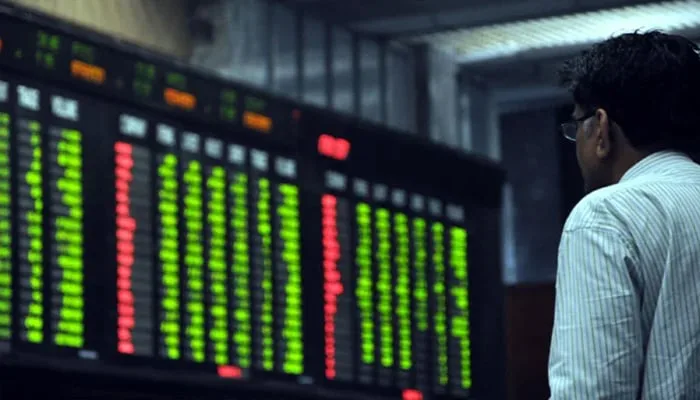The Pakistan Stock Exchange (PSX) commenced the new business week with a notable downturn, as the benchmark 100 index experienced a significant decline of 578 points. This decline has raised concerns among investors and market analysts about the underlying factors influencing the market’s performance.
Market Performance Overview
At the close of trading, the PSX benchmark 100 index stood at 78,232 points, reflecting a substantial drop from the previous trading session. Throughout the business day, the 100 index demonstrated considerable volatility, fluctuating within a range of 1,220 points. The highest level recorded today was 79,388 points, while the lowest level reached was 78,167 points.
Trading Volume and Market Capitalization
Today’s trading session saw the settlement of deals involving 38.5 million shares, with a total transaction value of 15.45 billion rupees. This activity led to a reduction in the market capitalization by 88 billion rupees, bringing it down to 10,321 billion rupees. The significant drop in market capitalization underscores the impact of the day’s negative trading trend on the overall market valuation.
Factors Contributing to the Decline
Several factors may have contributed to the decline observed in the PSX today. Market analysts suggest that a combination of domestic economic challenges, geopolitical tensions, and global market trends could be influencing investor sentiment and leading to a cautious approach in trading.
- Economic Indicators: Persistent concerns about inflation, interest rates, and economic stability in Pakistan could be causing uncertainty among investors. The fluctuating value of the Pakistani rupee and concerns over fiscal policies may also be contributing to the market’s volatility.
- Geopolitical Tensions: Regional geopolitical tensions and their potential impact on trade and investment flows might be causing apprehension among market participants. Investors often respond to geopolitical developments by adjusting their portfolios to mitigate perceived risks.
- Global Market Trends: Global market trends, including fluctuations in commodity prices, interest rate hikes by major economies, and international trade policies, can significantly influence emerging markets like Pakistan. Investors might be reacting to broader market signals and adjusting their positions accordingly.
Investor Sentiment and Market Outlook
The significant drop in the 100 index reflects a cautious and risk-averse sentiment among investors. The reduced trading volume and the substantial decline in market capitalization indicate that investors might be holding back on making large-scale investments amid the prevailing uncertainties.
Despite the negative start to the week, market analysts suggest that the PSX has the potential to recover, provided there is stability in domestic economic policies and an improvement in investor confidence. The government’s response to economic challenges and its efforts to create a conducive environment for investment will play a crucial role in shaping the market’s trajectory in the coming weeks.
Expert Opinions
Market experts emphasize the importance of closely monitoring economic indicators and staying informed about global market trends. Investors are advised to adopt a strategic approach, diversifying their portfolios to mitigate risks and capitalize on potential opportunities.
Financial analysts also highlight the need for regulatory bodies to ensure transparency and stability in the market. Effective regulatory measures can help build investor trust and foster a more resilient market environment.
The Pakistan Stock Exchange’s significant decline at the start of the week underscores the challenges facing the market. The 578-point drop in the 100 index and the reduction in market capitalization by 88 billion rupees reflect the cautious sentiment among investors amid economic uncertainties and geopolitical tensions.
Moving forward, the market’s recovery will depend on various factors, including domestic economic policies, global market trends, and investor confidence. By staying informed and adopting strategic investment approaches, investors can navigate the current volatility and position themselves for potential opportunities as the market stabilizes.



